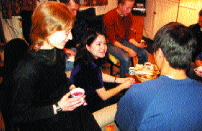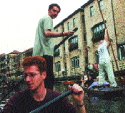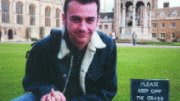Geoffrey A. Fowler '00, who served as one of this magazine's Ledecky Undergraduate Fellows, has been spending the current academic year in England on a Harvard-Cambridge Fellowship. He filed this post-graduate dispatch.
At 5 p.m. on Tuesdays, we talk pregnant chads, Charlie's Angels, and occasionally even German philosophy. Over tea, scones, and brie, nearly 30 of my Harvard classmates gather each week in Cambridge--not Massachusetts 02138, but Cambridgeshire, England CB2 1TQ.
We're still in a Cambridge, but couldn't be farther away from Harvard. "At Harvard, the greatest sign of superiority is that you can't schedule a meal with somebody for at least two weeks," says Lilian V. Faulhaber '00 as we walk through the English drizzle to tango lessons. But for the overachievers who competed to land fellowships at Cambridge after graduation, Harvard's I-have-the-busiest-PalmPilot culture has given way to the intimate culture of lingering formal Halls and pub chats with professors. Late at night, I've even crossed paths with noted Cambridge physicist Stephen Hawking, zipping along the sidewalk next to a pub.
At Cambridge, we're living the proof that time is relative.
Inside Trinity College's murky, gold-leafed Hall, a Latin motto crowning a portrait of the founder, King Henry VIII, reminds centuries of students of what makes Cambridge both frustrating and fulfilling. Semper eadem, it reads--"Always the same."
At its worst, the motto translates into frustrating inflexibility and encrusted hierarchy. Only this year did Cambridge begin experimenting with university-wide identification cards, and porters in black bowler hats still stuff (and lose) mail in public pigeonholes. Mysterious five-foot-tall doors can't be enlarged and dark mugging-prone passageways can't be lit for fear of destroying ambiance. "It's as if Harvard has taken a course in brand-spanking new management techniques and Cambridge is still stuck in the Middle Ages," says Caitlin Anderson '00, who is studying history at Trinity.
Porters strictly enforce rules regarding faculty grass-walking privileges, and "bedders" come into student rooms each morning as much to remind us of our elevated social status as to clean up. "At Harvard, I thought of the kitchen and custodial staff as people doing a job as part of a community," says Elizabeth Nathan '00 over chocolate-covered biscuits and tea at her room in Pembroke College. "At Cambridge, they're just treated like servants."
Beyond the university, the local pubs must turn hordes of drunk, brawling, publicly urinating townies (and gownies) onto the cobblestone street at 11:30 p.m. sharp because of a wartime provision that Parliament hasn't gotten around to changing. "In the United States, people are willing to bend the rules, but in England often people are under the thumb of their own ancient bureaucracy," says Anderson.
 But at its best, that Latin motto also translates into a kind of constancy--an attention to intimate details. After your stomach recovers from the beef, potatoes, cheese, mayonnaise, and custard mixed into every Hall meal, joining your best mates--all robed in academic regalia--for a drunken formal Hall ceremony that hasn't changed for centuries carries a certain magic.
But at its best, that Latin motto also translates into a kind of constancy--an attention to intimate details. After your stomach recovers from the beef, potatoes, cheese, mayonnaise, and custard mixed into every Hall meal, joining your best mates--all robed in academic regalia--for a drunken formal Hall ceremony that hasn't changed for centuries carries a certain magic.
Harvard pays lip service to advisers and tutorials, but at regular Cambridge supervisions, my faculty adviser pores over my prepared essays line-by-line, challenging their most subtle logical nuances in a way no Harvard grad-student teaching fellow or professor had time to offer. The intimacy of one-on-one teaching must be a terrible waste of time for the faculty, but when my supervisor asks me questions I can't answer, there's nobody else to turn to for an easy escape. Out of gross ine(infinity)ciency comes the potential for real intellectual growth.
"England has for so many years grown in on itself," suggests former Harvard-Cambridge scholar Louis McCagg '55, today a consultant to Cambridge University. "All its energy went out; they didn't have to compete because they were The Club." The result is, for sure, a certain refined manner and charm, but also a lack of ingenuity and drive. Says McCagg, "If new Cambridge is a conglomeration of the world, old Cambridge is an island of prominence."
The island mentality even influences extracurriculars and sports--equally popular at Cambridge and Harvard, but decidedly less preprofessional at Cambridge. Students take part because they're interested, not because they hope to land an internship with the prime minister. "They see it as a break from work, not another source of work," says Nathan. Student journalism is more about local politics than quality; after the editing massacre of two articles I'd written for the student newspaper Varsity, I couldn't face any more contributions. 
At least once per week, I get so frustrated with Cambridge that I want to give one of its eight-century-old walls a good kick of American anti-establishmentarianism. When do these kids ever work? C'mon, rebel! England just doesn't have American chutzpah.
On the other hand, British chill is also its charm. I've met dozens of friends-of-friends over a Wednesday-night pint, some of them now close mates. College-sponsored and neighborhood pubs fill up every night and the college "buttery" (canteen) supplies undergraduates with a wide range of wines and spirits. "I've had to drink more here, or else I wouldn't have any friends," says Nathan. "I drink more, but also enjoy it more than ever before."
From my window, the aggressive pre-consultants racing along the semi-toxic Charles River have given way to mad cows ruminating along a glorified creek named the Cam.
My senior room in Harvard's Eliot House last year was just as spacious as my scholar's room in Cambridge's Trinity College--but somehow I was always too busy to host a purely social gathering, and my friends were too busy to be guests. Today I own a kettle, two dozen teacups, and eight varieties of tea. (Do you take that with milk, or without?)
Half a year of participant-observation certainly hasn't made me a local. For sure, I've chopped my hair to conform with my mates' standard spikey-top coifs, I sprinkle the letter "u" in words with a new-found liberty, and Cambridge's 4 p.m. winter sunsets have colo(u)red my skin a whiter shade of pale. I wouldn't want to think exactly like an old Cambridge local, but I've learned to shed something of the thinking and pace that makes new Cambridge so successful but impersonal.
Suddenly, intimacy matters.






